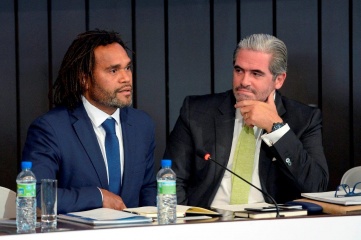At a conference hosted by ICSS Europe and the European Commission, international experts and leading policy-makers gathered in Brussels on Tuesday to call for sports bodies and governments to act against the trafficking of young people through sport.
The international movement of young athletes has risen dramatically in recent years.
“According to the United Nations, human trafficking is the third largest criminal enterprise in the world. However, trafficking of young athletes through sport, particularly football, is still a taboo in the industry,” said Emanuel Macedo de Medeiros, CEO of ICSS EUROPE.
“As an international organisation working to protect sport, the ICSS is committed to protecting young athletes and raising awareness about the growing issue of child trafficking in sport. Young athletes are not commodities. They are human beings and must be treated as such.
“As a week-long initiative of the European Commission that celebrates sport and physical activity and the positive role it can play in society, the EU Week of Sport was an important platform to raise awareness of the issue and place the topic in the minds of influential decision-makers.”
“Today also reinforces the ICSS’s commitment to safeguarding young people and I would like to encourage governments, law enforcement agencies and other experts in child protection to ensure that clear, practical and effective standards on recruitment, training, education and protection of children and young people are applied across all sports.”
The conference, which took place during the EU Week of Sport, brought together leading figures from sport, child protection and youth development and education.
“There is definitely a link between mobility of young athletes and trafficking. It is important that we put the issue of the child trafficking through sport, particularly from Africa to sports clubs in Europe, on the agenda of leading organisations in government and sport,” said Pascal Reyntjens, Chief of Mission, International Organisation for Migration (IOM) – Belgium & Luxembourg.
“Despite the clear progress made in the protection of minors and young athletes recently, further discussion between sports organisations and other bodies working in this area must take place.”
The conference also highlighted several themes underling the role of sport in education and how it can enhance economic and social development.
“Sport has the aim to bring people together. It is has the power to change the world and to unite people beyond regions, beyond colours. Sport has no borders and is universal,” said football superstar and UEFA Global Ambassador, Christian Karembeu.
“Through sport, we speak the same language. In sport, we have the same rules, the same life and have the same opportunities. Sport is also a powerful tool for integration and inclusion in wider society.
“I am very proud to be here today and have a strong interest in the topics discussed. Education through sport is very important and through it, we can have balance.”
International organisations attending the conference included: the European Commission, the Council of Europe, UNESCO, United Nations, International Labour Organisation, government organisations, UEFA and other representatives from the sport and Olympic movement, as well leading NGOs.


